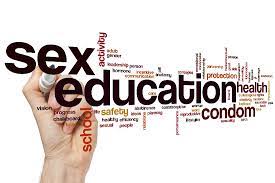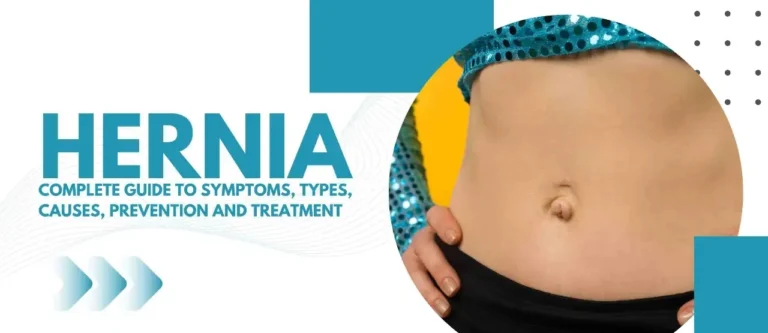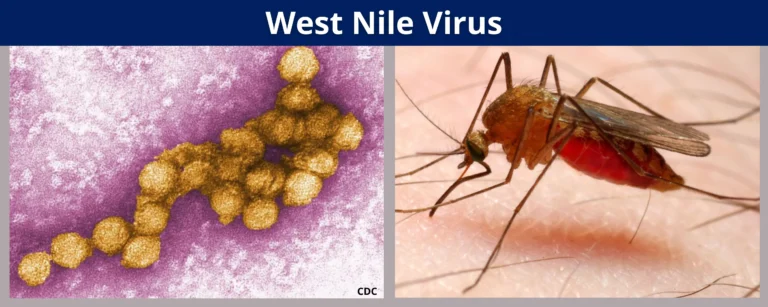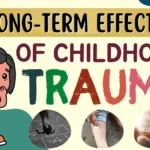Vaccines represent one of the greatest public health achievements in human history, preventing millions of deaths and countless cases of serious illness each year. From nearly eliminating polio worldwide to dramatically reducing measles outbreaks, vaccination programs have transformed global health outcomes. This comprehensive guide explores how vaccines work, their impact on disease prevention, and addresses common concerns about vaccine safety and effectiveness.
What Are Vaccines and How Do They Work?
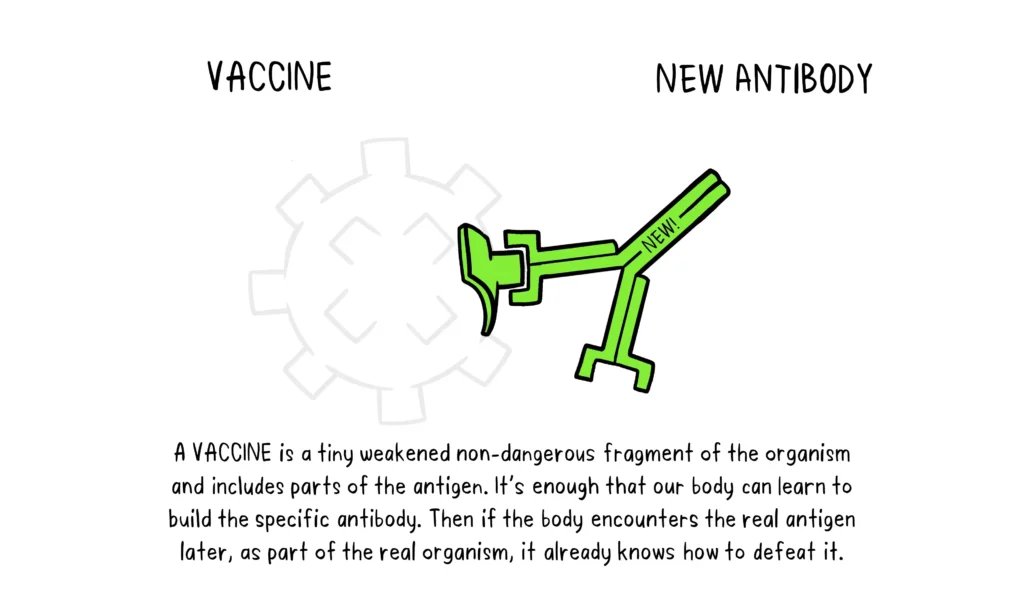
Vaccines are biological preparations that stimulate the immune system to recognize and fight specific diseases without causing the actual illness. They contain weakened, killed, or parts of disease-causing organisms that train the body’s natural defenses to respond quickly and effectively to future exposures.
Types of Vaccines:
- Live attenuated vaccines (weakened live viruses)
- Inactivated vaccines (killed pathogens)
- Subunit, recombinant, polysaccharide, and conjugate vaccines
- Toxoid vaccines (inactivated toxins)
- mRNA vaccines (newest technology using genetic instructions)
Immune Response Process: When a vaccine is administered, it triggers the immune system to produce antibodies and activate immune cells specific to that disease. This creates immunological memory, allowing the body to mount a rapid, protective response if exposed to the actual pathogen in the future.
Major Vaccine Success Stories
The impact of vaccines on public health is demonstrated through remarkable disease prevention achievements:
Polio Elimination: Once a feared disease causing paralysis in thousands of children annually, polio has been eliminated from most of the world through vaccination. Cases dropped from 350,000 in 1988 to fewer than 200 today, representing a 99.9% reduction.
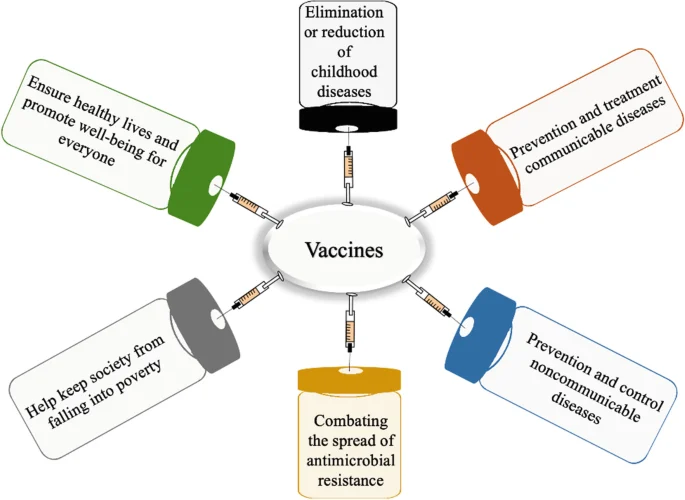
Measles Control: Before the measles vaccine became available in 1963, the disease infected 3-4 million Americans annually, causing hundreds of deaths. Vaccination programs have reduced measles cases by over 99% in countries with high vaccination rates.
HPV Prevention: Human Papillomavirus (HPV) vaccines have dramatically reduced infections with cancer-causing HPV types. Studies show up to 86% reduction in HPV infections among vaccinated populations, preventing cervical and other cancers.
Other Notable Successes:
- Smallpox: completely eradicated worldwide through vaccination
- Diphtheria, tetanus, and pertussis: cases reduced by over 95%
- Haemophilus influenzae type b: nearly eliminated in vaccinated populations
- Pneumococcal disease: significant reductions in invasive infections
Herd Immunity and Community Protection
Vaccines protect not only individuals but entire communities through herd immunity:
Concept Explanation: When a high percentage of a population is vaccinated, it creates a protective barrier that prevents disease spread, even protecting those who cannot be vaccinated due to medical conditions or age.
Threshold Requirements: Different diseases require different vaccination coverage levels to achieve herd immunity:
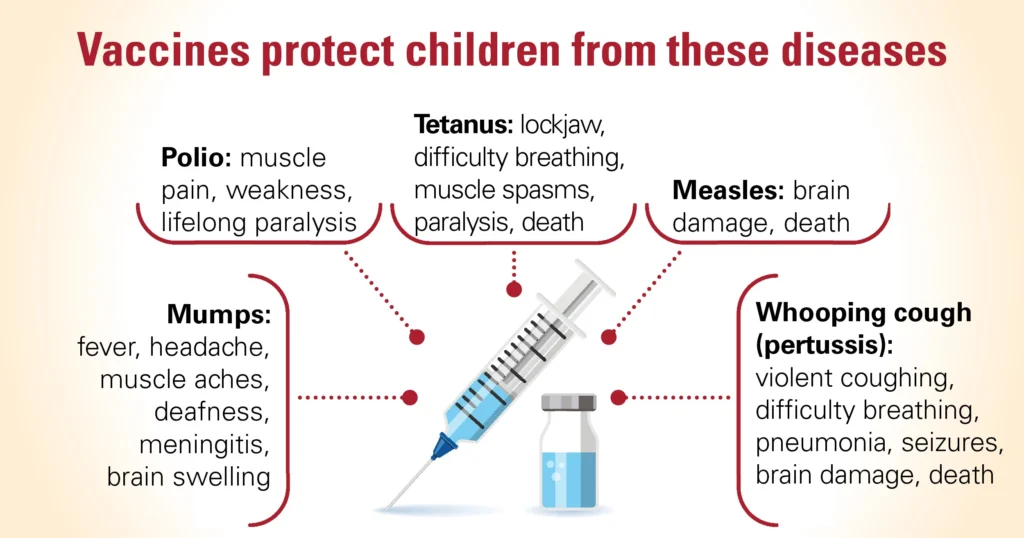
- Measles: 95% coverage needed
- Polio: 80-85% coverage
- Pertussis: 92-94% coverage
- COVID-19: estimated 70-85% coverage
Vulnerable Populations Protected:
- Newborns too young for vaccination
- Individuals with compromised immune systems
- People with severe allergies to vaccine components
- Those for whom vaccines are less effective due to medical conditions
Common Side Effects and Safety Profile
Vaccines have an excellent safety record, with serious adverse events being extremely rare:
Common Mild Side Effects:
- Soreness, redness, or swelling at injection site
- Low-grade fever
- Mild fatigue or irritability
- Temporary muscle aches
- Slight swelling of lymph nodes
Rare Serious Side Effects:
- Severe allergic reactions (anaphylaxis): 1 in a million doses
- Febrile seizures: mostly harmless and temporary
- Shoulder injury from injection: very rare with proper technique
- Fainting: more common in adolescents
Safety Monitoring: Vaccines undergo rigorous testing before approval and continuous monitoring after introduction. Multiple surveillance systems track adverse events and ensure ongoing safety.
Addressing Vaccine Hesitancy
Vaccine hesitancy, defined as delay or refusal of vaccination despite availability, poses significant public health challenges:
Common Concerns:
- Safety fears based on misinformation
- Religious or philosophical objections
- Distrust of government or pharmaceutical companies
- Belief that natural immunity is superior
- Concerns about vaccine ingredients
Evidence-Based Responses:
- Scientific studies consistently show vaccines are safe and effective
- Benefits far outweigh risks for recommended vaccines
- Natural infection often carries much higher risks than vaccination
- Vaccine ingredients are present in safe amounts and serve important functions
- Regulatory oversight ensures rigorous safety standards
Communication Strategies:
- Providing clear, factual information from trusted sources
- Acknowledging concerns while presenting evidence
- Sharing personal stories of vaccine-preventable disease impact
- Building trust through healthcare provider relationships
- Addressing cultural and religious considerations respectfully
Prevention Through Vaccination Programs
Successful vaccination programs require comprehensive strategies:
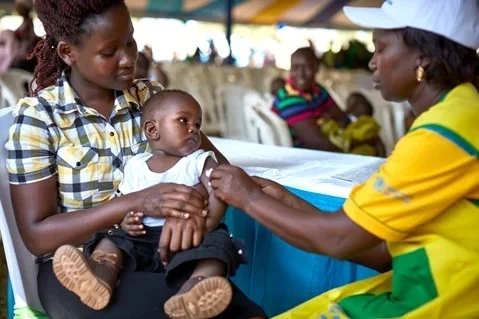
School Requirements: Most jurisdictions require certain vaccinations for school attendance, ensuring high coverage rates among children and protecting school communities from outbreaks.
Adult Vaccination: Adults need ongoing protection through:
- Annual influenza vaccines
- COVID-19 boosters as recommended
- Tdap boosters every 10 years
- Age-specific vaccines like shingles and pneumococcal
Travel Vaccinations: International travel may require additional vaccines based on destination risks, including yellow fever, typhoid, Japanese encephalitis, and others.
Special Populations: Healthcare workers, pregnant women, and immunocompromised individuals may need modified vaccination schedules or additional vaccines for optimal protection.
Global Vaccination Initiatives
International efforts continue to expand vaccine access and eliminate diseases worldwide:
Global Programs:
- Global Polio Eradication Initiative
- Measles & Rubella Initiative
- GAVI, the Vaccine Alliance (supporting low-income countries)
- WHO Expanded Programme on Immunization
Challenges:
- Reaching remote and conflict-affected populations
- Maintaining cold chain logistics in resource-limited settings
- Funding sustainable vaccination programs
- Combating misinformation and building vaccine confidence
Economic Impact of Vaccination
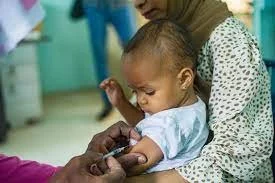
Vaccines provide substantial economic benefits beyond health outcomes:
Cost Savings:
- Every dollar spent on childhood vaccines saves $10 in healthcare costs
- Prevented medical expenses from avoided illnesses
- Reduced productivity losses from sick days
- Lower long-term disability and chronic disease costs
Societal Benefits:
- Increased economic productivity
- Reduced healthcare system burden
- Prevention of disease outbreaks and associated costs
- Enhanced quality of life for individuals and families
Future of Vaccine Development
Ongoing research continues to expand vaccination possibilities:
Emerging Technologies:
- mRNA vaccine platforms for rapid development
- Nasal spray vaccines for easier administration
- Universal flu vaccines providing broader protection
- Therapeutic vaccines for treating existing conditions
Target Diseases:
- Respiratory syncytial virus (RSV)
- Group B Streptococcus
- Cytomegalovirus
- Malaria and tuberculosis vaccines
Frequently Asked Questions

Q: Are vaccines safe for children? A: Yes, vaccines are very safe for children. They undergo extensive testing before approval and are continuously monitored for safety. Serious adverse events are extremely rare, and the benefits far outweigh the risks of vaccine-preventable diseases.
Q: Do vaccines cause autism? A: No, vaccines do not cause autism. This myth originated from a fraudulent study that was later retracted. Numerous large-scale studies involving millions of children have found no link between vaccines and autism.
Q: Why do we need vaccines for diseases that are rare now? A: Diseases are rare precisely because of vaccination programs. Without continued vaccination, these diseases would return quickly, as seen in communities with low vaccination rates where outbreaks still occur.
Q: Can vaccines overwhelm a child’s immune system? A: No, children’s immune systems can handle vaccines easily. Infants encounter thousands of germs daily, and vaccines expose them to a tiny fraction of what they naturally encounter. The vaccine schedule is carefully designed to provide protection at the right times.
Q: What should I do if I’m concerned about vaccine side effects?
A: Discuss your concerns with a healthcare provider who can provide personalized advice based on your medical history. They can explain the risks and benefits specific to your situation and address any questions you may have.
Q: How effective are vaccines at preventing disease?
A: Vaccine effectiveness varies by disease and vaccine type, but most childhood vaccines are 85-99% effective at preventing disease. Even when breakthrough infections occur, vaccinated individuals typically experience milder symptoms and are less likely to spread the disease.
Conclusion
Vaccines represent one of medicine’s greatest triumphs, preventing millions of deaths and dramatically improving global health outcomes. The evidence overwhelmingly demonstrates that vaccines are safe, effective, and essential for protecting individual and community health.
While vaccine hesitancy remains a challenge, open dialogue based on scientific evidence, compassionate communication, and building trust between healthcare providers and patients can help address concerns. The success stories of polio elimination, measles control, and HPV prevention demonstrate the incredible power of vaccination programs when implemented effectively.
As we face emerging health threats and work to eliminate remaining vaccine-preventable diseases, continued investment in vaccination programs, research, and public education remains crucial. The choice to vaccinate protects not only ourselves and our families but also contributes to the health and wellbeing of our entire community.
By understanding the science behind vaccines, their remarkable safety record, and their profound impact on public health, we can make informed decisions that protect ourselves and future generations from preventable diseases. The legacy of vaccination is one of hope, progress, and the collective power of science to improve human health on a global scale.
ALSO READ MORE HEALTH ARTICLES FROM CHIID HEALTH


